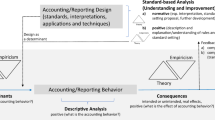Abstract
Let me first begin by saying that I agree in general with Brian’s proposition that the theory of the firm provides insights into requisite financial reporting systems. I also agree with Mike’s characterization of business models as diverse, subjective, and mostly aspirational and if I may add, essentially vacuous. I disagree with the notion that financial reporting and recognition and measurement principles should be tailored to business models. Rather, I shall make the argument that recognition and measurement principles should be invariant to diverse business models. Indeed, the theory of the firm would suggest universal recognition and measurement principles that apply independently of the business models. The role of business models, I contend, is to facilitate proper quantifications—the required output of applying the universal recognition and measurement principles.
Similar content being viewed by others
Notes
The theory of the firm as governance structure: From choice to contract Williamson (2002).
Refinements are possible. For example the difference between input and output prices can be decomposed into value added, and holding gains or losses. For details on implementation of the multiple measures model I am proposing see Ronen and Sorter (1972).
My suggestion that recognition and measurement principles be independent of business models is also consistent with Mike's claim that companies' value propositions and business models can be miss-identified by both outsiders and company management. (Consider Mike's Google example where the outputs are hard to describe in that they include intangibles that maintain the pre-eminence of the search engine by erecting barriers to entry and other devices).
Financial statements concept number one states: "The new series of Statements of Financial Accounting Concepts is intended and expected to serve the public interest within the context of the role of financial accounting and reporting in the economy—to provide evenhanded financial and other information that, together with information from other sources, facilitates efficient functioning of capital and other markets and otherwise assists in promoting efficient allocation of scarce resources in the economy.” (Emphasis mine).
References
Klein, B. (1980). Transaction Cost Determinants of 'Unfair' Contractual Arrangements. American Economic Review 70(May), 356–362.
Ronen, J. (1974a). Social costs and benefits and the transfer pricing problem. Journal of Public Economics, (March), 71–82.
Ronen, J. (1974b). Accounting for social costs and benefits. Objectives of Financial Statements, 2, American Institute of Certified Public Accountants, (May), 317–342.
Ronen, J., & Sorter, G. H. (1972). Relevant accounting. The Journal of Business (pre-1986), 45(2), 258.
Williamson, O.E. (1971). The vertical integration of production: market failure considerations. American Economic Review, 61(2), 112–123.
Williamson, O. E. (1979). Transaction cost Economics: the governance of contractual relations. Journal of Law and Economics, 22(2), 233–262.
Williamson, O. E. (2002). Nashville: Summer 2002. The Journal of Economic Perspectives, 16(3), 171, 25 p.
Author information
Authors and Affiliations
Corresponding author
Rights and permissions
About this article
Cite this article
Ronen, J. On the invariance of accounting principles to business models: a discussion of the Singleton-Green and Page articles. J Manag Gov 18, 707–716 (2014). https://doi.org/10.1007/s10997-012-9241-6
Published:
Issue Date:
DOI: https://doi.org/10.1007/s10997-012-9241-6



